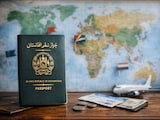- National Guard use in Los Angeles for immigration enforcement was deemed illegal by California's lawyer
- Trump deployed 700 Marines and 4,000 National Guard troops to Los Angeles amid immigration raids
- California sued, alleging violation of the Posse Comitatus Act banning military in civilian law enforcement
The US government's unprecedented use of National Guard troops in Los Angeles to protect officers carrying out President Donald Trump's immigration crackdown was illegal and should be ended, a lawyer for the state of California told a federal judge on Tuesday.
The lawyer said evidence presented from the landmark trial that began on Monday showed that soldiers had violated a 19th century law that bars the military from civilian law enforcement.
“The government wanted a show of military force so great that any opposition to their agenda was silenced," said the lawyer, Meghan Strong of the California Attorney General's Office.
Justice Department attorney Eric Hamilton countered that there was "substantial violence" in Los Angeles meriting military intervention and that the troops were only there to protect federal agents and property.
Trump ordered 700 Marines and 4,000 National Guard troops to Los Angeles in June in response to days of unrest and protests sparked by mass immigration raids. California's Democratic governor, Gavin Newsom, opposed the move and sued, alleging it violated prohibitions on the use of the military in law enforcement.
US District Judge Charles Breyer in San Francisco will determine whether the government violated the Posse Comitatus Act (PCA).
Breyer will also hear arguments on Wednesday on Newsom's legal right to bring the case. The judge has not said when he will rule.
The trial comes as Trump said he was taking the extraordinary step of deploying the National Guard to fight crime in Washington and suggested he might take similar actions in other American cities.
In the California trial, the administration sought to prove that the military was only used to protect federal personnel or federal property, which the administration said are permissible exceptions to the PCA.
California, meanwhile, sought to convince Breyer that troops crossed the line by setting up roadblocks, diverting traffic and making arrests, which Strong described as prohibited policing actions.
Government witnesses testified that although those actions are generally prohibited, there are exceptions when federal agents or property are in danger.
Breyer appeared skeptical at times of the government's assertion that Trump had sole discretion to decide when troops were needed. The president said in June the protests amounted to a rebellion against federal authority.
"Is it a 'rebellion' because the president says it is a 'rebellion'?" Breyer asked Hamilton during the government's closing argument.
Many of the troops have been withdrawn from Los Angeles, but California Attorney General Rob Bonta said on Monday that 300 National Guard members are still going on immigration raids and restricting civilian movements in the state.
The trial before Breyer will have limited impact on Trump's plan to deploy hundreds of National Guard troops to Washington.
(Except for the headline, this story has not been edited by NDTV staff and is published from a syndicated feed.)















